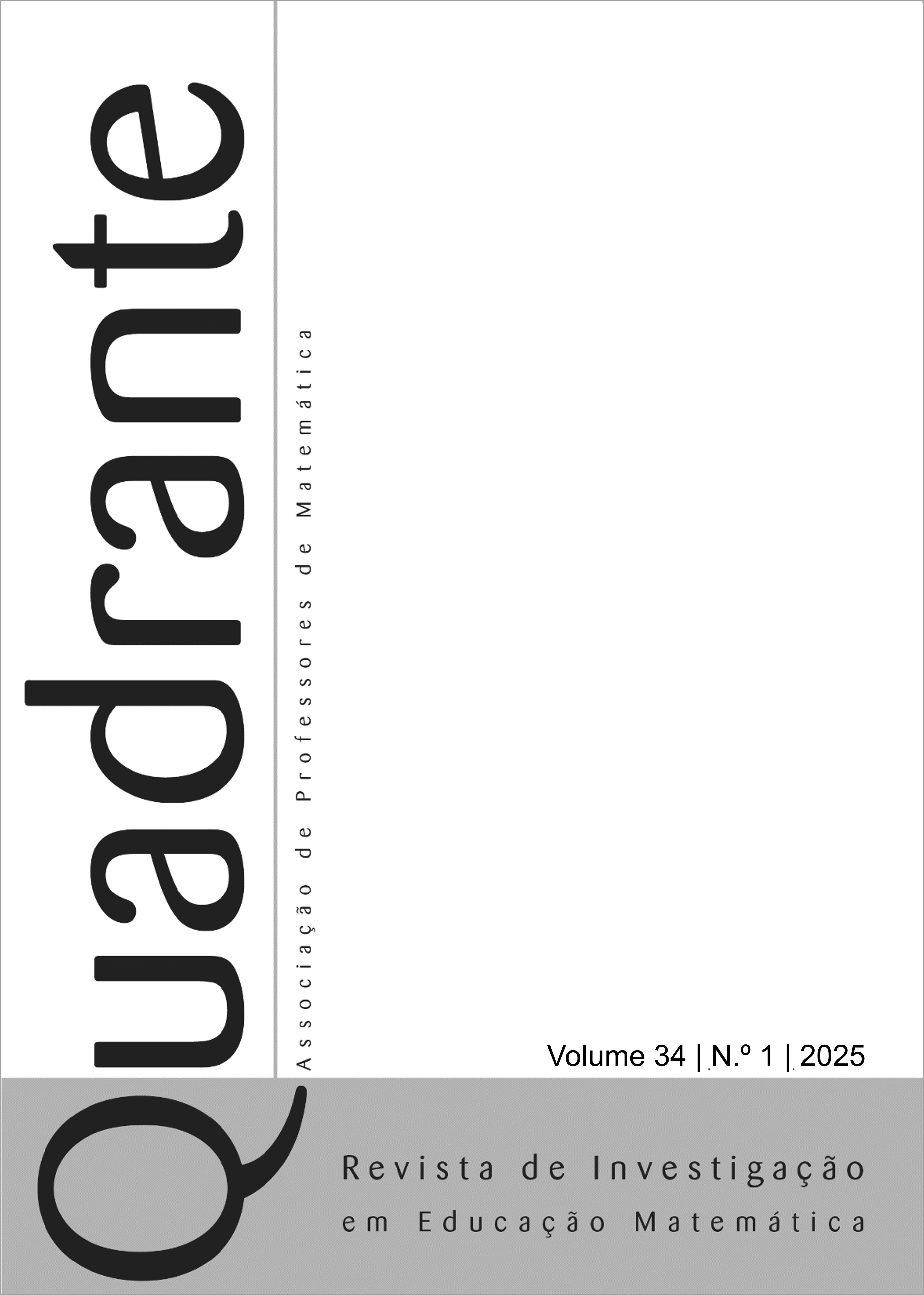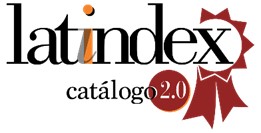Mathematics Teacher´s Specialized Knowledge manifested in selecting and using examples in the factorization of algebraic expressions
DOI:
https://doi.org/10.48489/quadrante.38106Palavras-chave:
mathematics teacher’s specialized knowledge, exemplification, factorization, case studyResumo
We present an approach to the specialized knowledge of a secondary mathematics teacher (teaching students aged 16 to 17) in the context of algebraic expression factorization (a topic that precedes quadratic equations). Using a qualitative approach and an instrumental case study, we gathered data through video recordings of lessons and semi-structured interviews. This data was analyzed using the Mathematics Teacher's Specialized Knowledge (MTSK) model. The results provide evidence that the teacher selects and uses examples by leveraging specific knowledge about the content, mathematics teaching, and the characteristics of students' mathematical learning. These findings contribute to our understanding of the possible relationships between specialized knowledge in algebraic expression factorization and the teacher's selection and use of examples, a topic that lays the groundwork for quadratic equations.
Referências
Adler, J., & Pournara, C. (2020). Exemplifying with variation and its development in mathematics teacher education. En D. Potari & O. Chapman (Eds.), International handbook of mathematics teacher education: Volume 1. Knowledge, beliefs, and identity in mathematics teaching and teaching development (pp. 329–353). Sense.
Ball, D. L., Thames, M. H., & Phelps, G. (2008). Content knowledge for teaching: What makes it special? Journal of Teacher Education, 59(5), 389–407. https://doi.org/10.1177/0022487108324554
Barreto, Y. (2009). Uso de material concreto en la enseñanza del álgebra. Revista de Educación Matemática, 21(2), 45–56.
Carrillo, J., Climent, N., Contreras, L. C., & Muñoz-Catalán, M. C. (2013). Determining specialised knowledge for mathematics teaching. En B. Ubuz, C. Haser, & M. Mariotti (Eds.), Proceedings of the CERME 8 (pp. 2985–2994). ERME.
Carrillo, J., Contreras, L. C., & Flores, P. (2013). Un modelo de conocimiento especializado del profesor de matemáticas. En L. Rico, M. C. Cañadas, J. Gutiérrez, M. Molina, & I. Segovia (Eds.), Investigación en Didáctica de la Matemática: Homenaje a Encarnación Castro (pp. 193–200). Comares.
Carrillo, J., Escudero, D., Flores, E., & Contreras, L. C. (2018). The mathematics teacher’s specialised knowledge: Theoretical framework and research synthesis. Springer. https://doi.org/10.1007/978-3-319-97571-8
Chick, H., & Harris, K. (2007). Teacher’s pedagogical content knowledge for the mathematics classroom. En J. Watson & K. Beswick (Eds.), Proceedings of the 30th Annual Conference of the Mathematics Education Research Group of Australasia (pp. 139–148). MERGA.
Escudero, D., Flores, E., & Carrillo, J. (2012). El conocimiento especializado del profesor de matemáticas. En Memorias de la XV Escuela de Invierno de Matemática Educativa (pp. 35–42). Cinvestav.
Figueiredo, C. A., & Contreras, L. C. (2013). La función cuadrática: variación, transparencia y dos tipos de ejemplos. Avances de Investigación en Educación Matemática, (3), 7–25.
Figueiredo, C. A., Contreras, L. C., & Carrillo, J. (2012). Consideraciones acerca de la ejemplificación en la clase de matemáticas. Revista EMA, 17(1), 7–29.
Fitzmaurice, O., & Hayes, B. (2020). Prospective mathematics teachers’ understanding of the factorisation of quadratic equations. Irish Educational Studies, 39(2), 173–189. https://doi.org/10.1080/03323315.2019.1657500
Flores, P., García, D., & Vega, L. (2017). Aplicación móvil para el aprendizaje del álgebra en secundaria. Revista Iberoamericana de Tecnología Educativa, 13(1), 25–32.
Girit, D., & Akyuz, D. (2017). Investigating pre-service mathematics teachers’ pedagogical content knowledge on algebra. European Journal of Science and Mathematics Education, 5(2), 123–135.
Goldenberg, E. P., & Mason, J. (2008). Shedding light on and with example spaces. Educational Studies in Mathematics, 69(2), 183–194. https://doi.org/10.1007/s10649-008-9147-4
Herbst, P., & Kosko, K. (2012). Mathematics knowledge for teaching high school geometry. http://goo.gl/WCA5X8
Jiménez, C., Rodríguez, A., & López, J. (2011). Comprensión de expresiones algebraicas en estudiantes de secundaria. Revista de Investigación Educativa, 29(1), 117–134.
Karaağaç, M. K. (2005). The role of teacher knowledge in student learning. Mathematics Education Review, 16(1), 23–32.
Kullberg, A., Runesson Kempe, U., & Marton, F. (2024). The importance of distinguishing aspects in students’ learning: Algebraic expressions. Mathematics Education Research Journal. https://doi.org/10.1007/s13394-023-00496-5
Marton, F., & Morris, P. (2002). What matters? Discovering critical conditions of classroom learning. Teaching and Teacher Education, 18(3), 329–344.
Marton, F., Runesson, U., & Tsui, A. (2003). The space of learning. En F. Marton & A. Tsui (Eds.), Classroom discourse and the space of learning (pp. 3–40). Lawrence Erlbaum Associates.
Mok, I. A. C. (2009). Teaching quadratic factorization: A case study in a Hong Kong secondary school. International Journal of Mathematical Education in Science and Technology, 40(4), 507–520.
Noto, M. S., Rahmawati, R., & Lestari, H. P. (2020). Students' difficulties in algebra: A case in Indonesia. Journal of Physics: Conference Series, 1657, 012001. https://doi.org/10.1088/1742-6596/1657/1/012001
Rowland, T., Huckstep, P., & Thwaites, A. (2009). Developing primary mathematics teaching: Reflecting on practice with the knowledge quartet. SAGE.
Sánchez-Acevedo, N., Sosa, L., & Contreras, L. C. (2023). Posibles relaciones entre el conocimiento especializado del profesor de matemáticas con la ejemplificación. En Actas del VI Congreso Iberoamericano sobre Conocimiento Especializado del Profesor de Matemáticas (pp. 114–121). Universidad de Granada.
Sánchez-Acevedo, N., Sosa, L., & Contreras, L. C. (2024). Conocimiento especializado del profesor y la enseñanza del álgebra escolar. Revista Latinoamericana de Educación Matemática, 34(1), 89–110.
Shulman, L. S. (1986). Those who understand: Knowledge growth in teaching. Educational Researcher, 15(2), 4–14. https://doi.org/10.3102/0013189X015002004
Yildiz, A., & Akyüz, D. (2019). Teachers’ knowledge and practices for teaching algebra in secondary schools. Journal of Mathematics Teacher Education, 22(3), 269–294. https://doi.org/10.1007/s10857-018-9408-4
Ying, Z., Lin, T.-J., & Wang, H.-C. (2020). Students’ algebra learning difficulties and strategies: Evidence from Taiwan. International Journal of Science and Mathematics Education, 18(7), 1253–1272. https://doi.org/10.1007/s10763-019-10017-9
Zakaryan, D., Leikin, R., & Waisman, I. (2018). Characteristics of teachers’ examples in the context of generalizing patterns. International Journal of Science and Mathematics Education, 16(4), 731–752. https://doi.org/10.1007/s10763-016-9789-2
Zodik, I., & Zaslavsky, O. (2007). Mathematics teachers’ choices of examples that potentially support or impede learning. Research in Mathematics Education, 9(1), 143–155. https://doi.org/10.1080/14794800701453751











